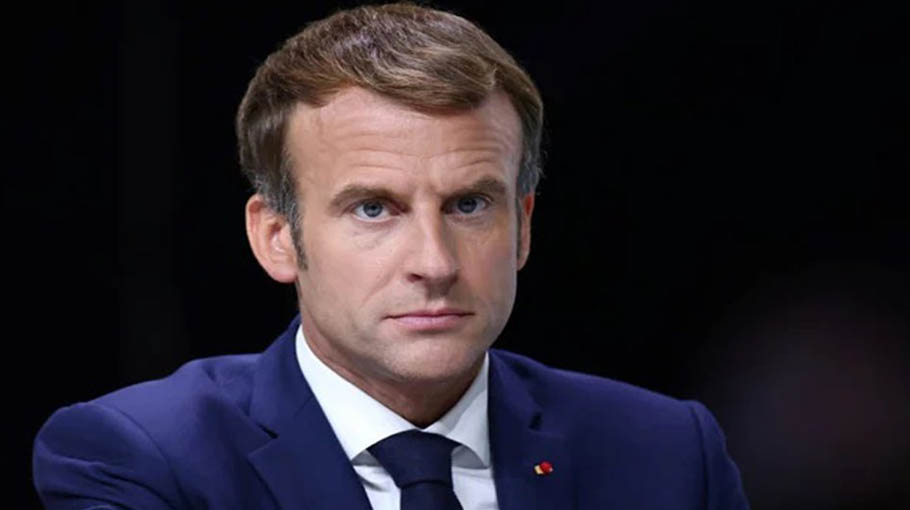Macron wades into Russia-Ukraine crisis as mediator

French President Emmanuel Macron will fly to Russia and Ukraine next week in an attempt to avert conflict between the neighbours, reprising his role as a crisis mediator that has produced limited results in the past.
The 44-year-old leader, who is facing elections in April, has repeatedly thrown himself into the search for solutions to some of the world's most acute diplomatic problems from Iran's nuclear programme to Libya's civil war.
His latest attempts to lower tensions between Russian President Vladimir Putin and Ukrainian counterpart Volodymyr Zelensky are consistent with the two main features of his thrusting foreign policy since coming to power in 2017.
He has always argued that Europe and the European Union should take greater charge of its own defence and security, and has sought to push France forward on the international stage with what he describes as "diplomacy of audacity."
He laid out this philosophy in front of French ambassadors in 2019, telling them that Europe risked disappearing unless it stood up for itself and arguing that the only choice is "to take part in the game and use our weight".
"I believe in one thing: it's a strategy of audacity and taking risks," he said.
This approach has led to some highly public setbacks, particularly early in his term, which some critics think revealed his naivety and France's limitations as a middle-ranking world power.
"France has a long tradition of mediating, but Emmanuel Macron in particular has wanted to be a sort of balancing power," said Bruno Tertrais from the Foundation for Strategic Research think-tank in Paris.
"It's striking, however, how his efforts have rarely led to success."
Among Macron's failures was an initiative to try to broker a solution to the Libyan civil war in 2017 which caused friction with EU partner Italy and led to criticism that France was secretly supporting a local warlord.
On the Iran nuclear crisis, Macron repeatedly tried to broker direct talks between former US president Donald Trump and Tehran, even flying the Iranian foreign minister unannounced to a G7 meeting in France in 2019 -- in vain.
Following a huge port explosion in Beirut that brought down the government in Lebanon in 2020, Macron visited the disaster scene, sleeves rolled up, and promised to help bring about a "new political order".
There has been no radical reform since and Lebanon remains mired in crisis.
The summer before, in 2019, the French leader invited Putin to his summer holiday residence in a surprise attempt to try to reset relations, which went down badly in eastern Europe where EU countries feel most threatened by the Kremlin.
"You can't criticise Emmanuel Macron for trying to launch mediation efforts, but you can criticise him in some situations for doing it on his own," Tertrais said.
The French president on Friday exchanged views with German Chancellor Olaf Scholz, who is still taking his first steps on the world stage after succeeding Angela Merkel in December.
Tertrais said one success was Macron's "quite spectacular" intervention in 2017 to free Lebanon's then prime minister Saad Hariri after he was effectively detained in Saudi Arabia.
Analysts are unsure what the French leader can achieve during his visits to Moscow and Kyiv on Monday and Tuesday to de-escalate a crisis sparked by the massing of around 100,000 Russian troops on Ukraine's border.
Tatiana Kastoueva-Jean at the French Institute of International Relations (IFRI) said that Putin sees Macron as the de-facto leader of Europe after veteran German chancellor Merkel stepped down after 16 years in power.
"In Germany, the new coalition government is still getting up to speed," she said. "So Macron is the voice of Europe in talks with Putin."
France also currently holds the rotating presidency of the 27-member European bloc.
Michel Duclos, a former ambassador at the Montaigne Institute, a Paris-based think-tank, said the French president has been wise not to build up expectations and appears to be coordinating better with EU allies.
"You get the impression he has learned from his previous failures," he told AFP.
The French presidency on Friday was not promising miracles from Macron's trip.
He will "make contact, engage in negotiation in the clearest possible terms," the presidency said.
"It is not a question of settling everything" but of moving towards a "de-escalation", it said.
At home, political observers are unsure how the flurry of diplomacy will influence Macron's re-election chances.
With the first round of the election looming on April 10, Macron will also have to decide in coming weeks whether to pull out a French force deployed in Mali in west Africa where relations with the ruling military junta have broken down.
Macron's attempted peace-making "reinforces his international stature" but brings with it the risk of failure which opponents would use, a French lawmaker close to Macron told AFP this week, asking not to be named.
"He has to show that he can obtain concrete results."



